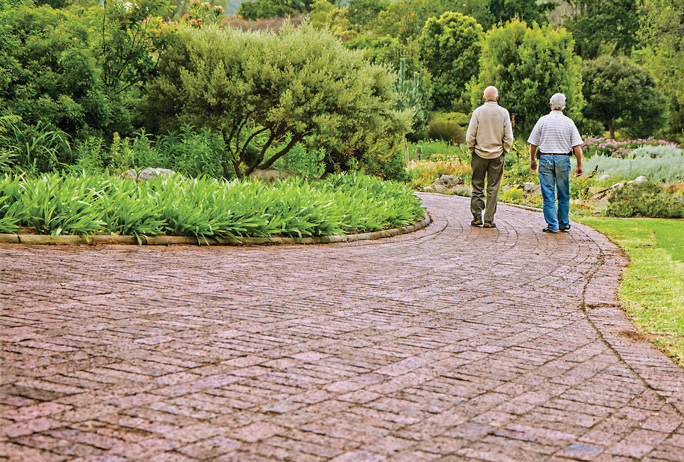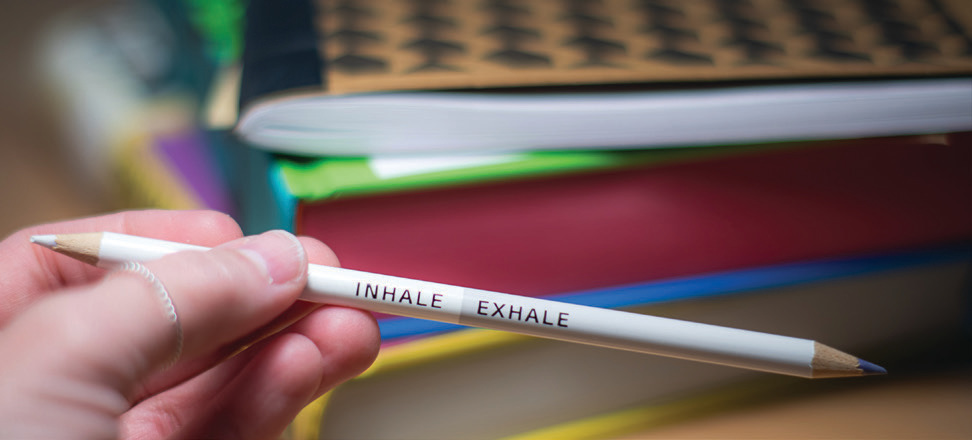 Few people would deny that the past two years of Americans facing COVID-19 have been life-changing. Bringing uncertainty about finances, personal relationships and work lives, the pandemic will most likely have long-lasting effects many people would never have anticipated.
Few people would deny that the past two years of Americans facing COVID-19 have been life-changing. Bringing uncertainty about finances, personal relationships and work lives, the pandemic will most likely have long-lasting effects many people would never have anticipated.
Working from home creates isolation and loneliness, families and friends are restricting their social interaction, and people are fearful for their own safety in a world where mask-wearing, vaccinations and testing have become routine. Stress has become a byproduct of the world of COVID-19 and its aftermath to get to a new normal.
“In some ways, we have adjusted to life during the pandemic — so much so that all the stress we face can start to feel normal, but the challenges we face are anything but,” says Cortland Dahl, Ph.D., chief contemplative officer at Healthy Minds Innovations and scientist at the Center for Healthy Minds at the University of Wisconsin-Madison. “Research is showing that the effects of the pandemic on our mental health are much more far-reaching than we first thought.”
Those effects can show in physical manifestations, including diminished immunity and accelerated aging. They may also cause changes in mental health, swaying a sense of emotional well-being.
“Remember that it’s totally natural to feel the struggle to make it through the day, and these feelings are predictable responses,” Dahl says. “It’s important to keep in mind that you’re not alone in these challenging times.”
Making lifestyle changes to cope throughout the pandemic requires self-examination, contemplation and a fresh approach to managing time, family and pressures that seem to be more present than ever before.
“Living with this level of long-term stress, anxiety and lack of enjoyment can cause health problems such as heart disease, obesity, cognitive decline and depression,” says Katie Sandler, The Impact Coach, based in Fort Lauderdale, Florida. “Recognizing that chronic stress can negatively affect physical and mental health is the first step toward achieving better well-being. And there are some very doable techniques to make it through these challenging times.”
Acknowledging the pandemic’s effects
As the world has dealt with the COVID-19 pandemic, a new set of fears and challenges has emerged — from individuals being afraid to leave their homes to adapting behaviors related to socializing and carrying on the activities of daily life in a new and more comfortable way.
“During the pandemic, people began to isolate themselves and change their social behaviors, in effect cutting themselves off from the very networks that had previously helped them cope,” Dahl says. “Being told that COVID-19 could spread through contact with other people meant that all of a sudden, people didn’t go shopping or to community events, and they stopped inviting friends to their homes or venturing out to visit family. It became a very real threat to continuing the supportive in-person socializing that so often serves as an outlet for dealing with frustrations, fears and doubts.”Turning to online communication removed the all-important personal contact, the chance to interact on a more natural level. It became a way to seemingly connect without having to invest emotion or intimacy.
“For close to two years, people have compensated by developing a ‘new normal’ to stay in touch with family, friends and work associates,” Dahl says. “In effect, these new coping behaviors have removed genuine social interaction and support and replaced it with faces on a computer or phone screen.”

The key, he says, is to realize that physical distance between people doesn’t mean social distance.
“You can feel support from others without being in the same room,” he says. “For instance, you can use a technique we call ‘appreciative meditation’ to connect with someone by recalling their positive qualities. Role-play in your mind to bring back a moment when this person was kind to you and re-create those feelings of support and compassion.”
He says that these reflective moments can help you feel closer to the person and might even trigger an action to establish a meaningful connection such as a telephone call or sending a message of gratitude.
“Connecting with people will be crucial to getting back to normal,” Sandler says. “Having lunch with a friend, inviting a few people over to your home or re-engaging with a hobby or social organization will help. It most likely will not be exactly the way it was before the pandemic, but it’s a strong first step to resuming your life as you remember it.”
Moving toward your new normal
Both Sandler and Dahl say that understanding the connections between stress and physical or mental wellness is the first step toward adapting to the new normal, and Sandler emphasizes that practicing mindfulness is crucial to making significant changes.
“Mindfulness is synonymous with being fully present and paying attention to what is happening in the moment,” she says. “Being mindful can literally become a hard break from spiraling stress to allow you to focus on the here and now, identify feelings and increase awareness of the specific challenges at hand.”

Her other byword is “intention,” consciously deciding on a plan forward.
“First, set the intention to make your life less hectic, to clear the way to formulate your thoughts, plans and goals,” she says. “Decide to reduce your stress — set the intention to do so — then chart a path to help you make the necessary changes to achieve that goal. You will have to put some work into it, but what you get back will be rewarding.”

Dahl also supports embracing a new perspective to break the cycle of stress, becoming more cognizant of the need to make a long-lasting transformation to better handle stress.
“By recognizing that stress — in fact any kind of change — can not only affect your mental well-being but your physical health as well, you can begin to adapt behaviors that will help you through these changeable times,” says Sandler. “Admittedly, it may be difficult to understand exactly how your life has changed, but you can see the indicators: increased fatigue, burn out, foggy brain and a sense of feeling disconnected or alone. Although you’re tired, you’re not falling asleep easily or, worse yet, you’re tossing and turning all night.”
Dahl’s program at Healthy Minds Innovations has done extensive research on how meditation can positively influence people’s ability to cope with change and break the cycle of stress. Based on meditation principles, the technique helps people unplug and focus on prioritizing their own well-being.
“The good news is that we can learn simple skills to manage our stress and even to learn and grow from adversity,” Dahl says. “Stress can be overwhelming at times, but the research shows that even five minutes a day of a simple practice like meditation can have a large impact on our lives and help us respond to stress in a healthy way.”


